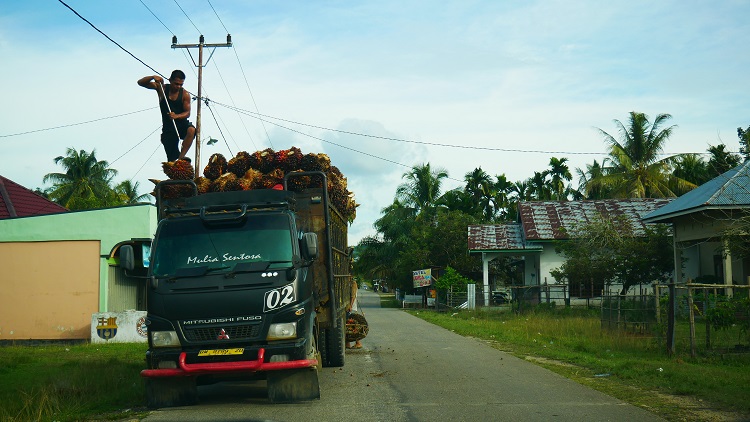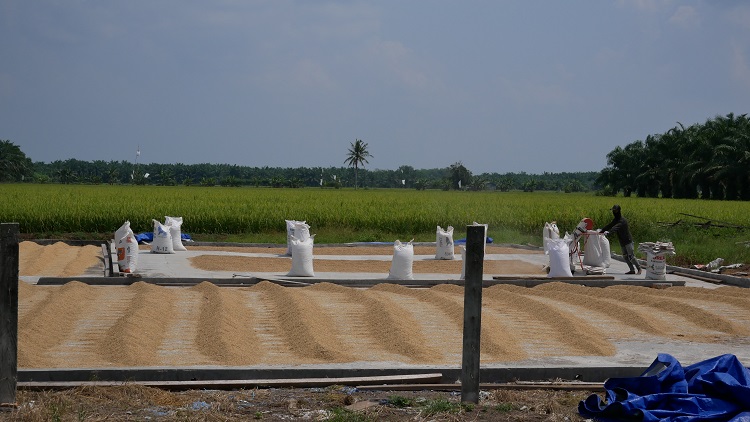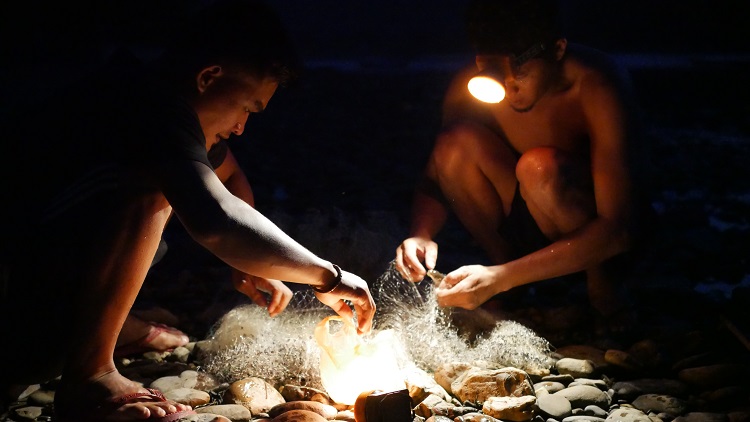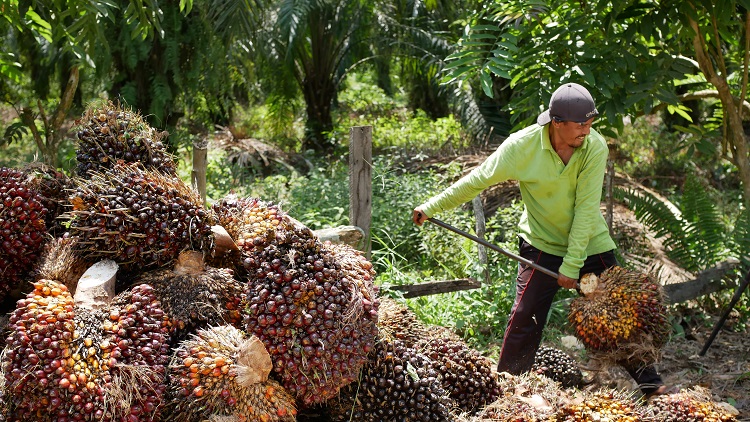Be there! Exploring small oil palm plantations from Riau (not Europe)
Giulia Zaninelli
I started working on the topic of palm oil as a postgraduate student in Italy. In 2016 I conducted a field study in the province of Aceh to explore the small oil palm plantation as political arena. It was my first time in Indonesia and I had very little knowledge of its societies, cultures and languages: theoretically I was trained enough, but I needed to have experience in the field.
In 2015/2016 the public discourse in Italy was imbued with ‘palm oil-phobia’. The media seemed to be awash with news reporting and experts talking about this vegetable oil. There were two main narratives used: health and the environment. The health narrative was focused on how dangerous palm oil could be for gut health – it has been linked to weight gain and also cancer. I call it ‘palm oil-phobia’, because this narrative is accompanied by the idea of ‘market invasion’ that would damage the worldwide famous ‘Mediterranean diet’ and the ‘traditional way of living and eating’.
The environmental narrative was centred on the loss of biodiversity, forest destruction and endangered orangutans. I was volunteering with different environmental NGOs in my city and even if I considered myself an environmentalist, I found some ambiguities that pushed me to want to deepen my understanding of this topic.
Palm oil
Since the 1970s there has been an increase in foreign and national investment in Indonesia related to the exploitation of various natural resources: precious wood, natural gas and oil and large areas of forest have been replaced with palm oil plantations.

Palm oil plantations in particular are closely watched and scrutinised by various political and economic actors from environmental and environmental justice NGOs, to investments funds or banks in the global market. As Amnesty International pointed out in 2016, this sector is imbued with a variety of problems: labour exploitation, lack of significant protective equipment, child labour, worsening environmental conditions in local territory and conflicts with neighbouring communities.
At the same time, as Michael Moore’s recent documentary ‘Planet of the Humans’ (2020) shows, there is a strong global call for leaving fossil fuels behind and embracing the new reality of biomass and biofuel. At a commercial level there is an evident push, especially within Europe, towards those fuels that are considered to be more sustainable. In 2019 the European Parliament voted to phase out the importation of palm oil by 2030, because it leads to deforestation in Malaysia and Indonesia.
Besides these wider environmental, conservationist and economic considerations, the livelihoods of the millions of workers, farmers and small-scale owners who operate within this industry are rarely, if ever, recognised or given a voice.
Inside Riau
In Riau province I met small-scale landowners who had decided to convert their small oil palm plantations into other crops or were intercropping oil palms with other profitable crops like chillies, corn, rice, pineapple and other fruits in order to stave off economic difficulties.
As Pak Hanafiah*, a small-scale owner told me, the sustainability of his small oil palm plantation is deeply tied to his desire to pass on his land to his son and subsequently to his grandson. The idea of hereditary landownership is strong and very important for small-scale owners especially for those who rely mostly on income from the plantation. As he explained to me, in order to do more to save the environment what is needed is not a process of certification attesting to the quality of the product but instead more should be done to raise awareness in people’s hearts, to encourage the better use of land resources, fertilisers and pesticides. Pak Hanafiah believes that by increasing awareness amongst farmers in this way, then it will be possible to keep working their lands without endangering the environment.

Farmers and workers are trying to cope with the economic, climatic and social difficulties they face on a daily basis. Nothing is taken for granted. Any understanding of their situation must always start with an appreciation of their semi-precarious way of life.
Limits of certification
Small-scale owners are exploring the possibility of joining Roundtable on Sustainable Palm Oil (RSPO) projects and some of them are already part of this system. RSPO is a not-for-profit organisation that unites different stakeholders from the main sectors of the palm oil industry: oil palm producers, traders, consumer goods manufacturers, large and small retailers, investors, and environmental and social NGOs. RSPO’s aim is to create and improve global standards for sustainable palm oil.
The RSPO has been developing a set of environmental and social criteria and conditions that companies must follow in order to produce Certified Sustainable Palm Oil (CSPO). If those criteria are properly applied, they can help to reduce the ecological and socially negative impacts of palm oil cultivation.
Worldwide more than 4,000 members have joined the RSPO system. They have committed to produce, source and/or use sustainable palm oil certified by the RSPO. For small-scale owners to receive that certification means being part of a larger supply chain, but to achieve it they are required to fulfil every single criterion and for very small-scale owners (1 to 3 hectares) in particular, this is simply not economically sustainable.
Precarity
The majority of small-scale farmers are living in precarious equilibrium on the poverty line. As McCarthy observes, these farmers may have a very small-scale land holding to cultivate, or they are landless day wage labourers. Their situation is described as fakir (destitute) and miskin (poor). This is especially true for small-scale oil palm plantation owners who must cope with added challenges due to climate change and resource costs.

My friend Indra* showed me how he copes with economic disadvantage during his daily life. He owns a small oil palm plantation, around 0.8/1 ha situated close to his village near the river. The plantation’s income alone is not sufficient to support the family’s basic needs. When he is not working at the kebun (small garden/plantation), he carries out various small jobs including as a daily-wage worker for other villagers, helping environmental NGOs with projects nearby. After evening prayers he goes fishing to find food for his children.
My friend Ucu* is always looking for rezeki (success). He works from time to time on an agent’s truck transporting the oil palm bunches to the closest mill. However, this job is not regular and so he also helps his friends in the sawah or to dry rice, within a system supported by an infinite exchange of favours.
After a hard day working as a day labourer lifting twenty kilogram palm bunches, Ucu returns home to his family, uncertain about how much, if any, work there will be tomorrow. He does not have much money in his pocket, but it could be worse. At least he has a job. He can earn money to cover not only his basic needs but also, if he is lucky, so he can eventually become a consumer and someone to envy. As he asked me once ‘if we don’t cultivate oil palms how can we cultivate and spread harapan (hope) around this villages?’
Giulia Zaninelli (g.zaninelli2@campus.unimib.it) is a PhD candidate in Cultural and Social Anthropology at the University of Milan-Bicocca, Italy. She first visited Riau on a short field study on small oil palm plantations in Aceh in 2016 and is currently working on the same topic for her PhD research.
*Names have been changed.
